The United Front
Dear Upping the Anti,
You have produced a stimulating issue of the journal (UTA 3). The backgrounder on the Six Nations struggle at Caledonia was very useful and on a different level, so were the interviews with William Robinson and Aijaz Ahmad.
I want to take issue with your editorial particularly as it concerns the anti-war movement where I think you often miss the point or go seriously astray. Your portrayal of the protest march as a “stage-managed and ultimately disempowering ritual” reflects perhaps your own impatience but is blind to the reality that millions of people have been politicized and gained a sense of their collective power through the mass public demonstration. It is likely to remain a central mobilizing tool.
I can remember debates in the 1960s about the efficacy of the mass protest march. It was one of the lines of demarcation between ultra-left and utopian currents and those who were moving towards Marxism. Direct action is not necessarily counterposed to broad mobilization and often produces successful innovative tactics in what is already a real or incipient mass struggle. One thinks of the sit-down strikes of auto workers in the 1930s or the lunch counter sit-ins organized by the Student Non-violent Coordinating Committee in the early years of the American civil rights movement. What is at issue are isolated actions not connected to a broader movement – the propaganda of the deed in the anarchist tradition or the hallucinatory ultra-leftism of the Weather Underground.
You make no attempt to bridge the gap between a minimal and maximal program. The demand for “troops out of Afghanistan now” is objectively anti-imperialist even if it is not explicitly so. It should be the central demand of the anti-war movement because it can unite the largest number in opposition to the war on a principled basis. And it should be defended against those liberal or reformist forces arguing for negotiations with the Taliban or as Jack Layton proposes, for Canadian troops and civilian agencies to engage in non-offensive security or reconstructive efforts, which you rightly denounce as imperialist intervention under the guise of ‘peace-keeping’ or ‘peace-building.’
To be sure, the slogans and tactics of the anti-war movement should be democratically debated and resolved in open anti-war conferences. There is clearly a need for education of anti-war activists and the public about the imperialist nature of the war and socialist and other anti-capitalist groups must have the right to promote their views at anti-war events. At the risk of diluting the focus through ‘slogan creep,’ there is every reason to incorporate other demands relating to defence of civil liberties, Palestinian solidarity or against Canadian intervention in Haiti if these help broaden the movement. But trying to transform the movement into an anti-imperialist front is a recipe for isolation and disunity. The split of the American anti-war forces between the ANSWER and UFPJ coalitions is to be avoided.
Finally, an anti-war movement that fights in concrete terms for an end to imperialist intervention will not be so easy for liberals and reformists to “recuperate.” If the NDP or Liberal Party politicians support the movement’s demands for their own reasons, tant mieux. That will be a reflection of a weakness in their camp not in ours. In the spirit of the united front, the fight against imperialist war should be taken deep into the New Democratic Party to mobilize the large reservoir of anti-war sentiment there and exert pressure on its leadership.
The editorial, reflecting the general orientation of the journal, seeks a creative fusion or perhaps a middle ground between Anarchism and Marxism. That is certainly your prerogative but in the process I detect a tendency to ignore, gloss over, and even distort political controversies within the Marxist tradition.
In particular, you seem innocent about the impact of Stalinism in the history of the workers’ movement. For example, the claim that the European Communist Parties adopted the united front in response to the rise of Fascism really is at variance with any informed analysis of the period. The ‘red united front from below,’ proclaimed by the newly Stalinized Comintern after 1929 ushered in a triumphalist and reckless sectarian policy (social democracy equals social fascism) which facilitated the Nazi rise to power. After 1935, the Comintern tacked 180 degrees to the right, inaugurating the era of the openly class collaborationist ‘popular front’.
Likewise, your brief dissection of May ‘68 in France suffers from inattention to the class collaborationist political reflexes of the PCF faced with a powerful general strike and major crisis of the French state. Instead you focus on the party’s ideological hostility to the anarchic “sous les pavés, la plage” spirit emanating from the Quartier Latin and characterize the PCF’s reimposition of control as a victory for the ‘united front!’
Following up on Tom Keefer’s critique of the International Socialist Tendency in UTA 2 (“Marxism, Anarchism, and the Two Souls of Socialism”), your editorial levels some serious but unsubstantiated charges about the Canadian group’s modus operandi in anti-war work. Indeed Draper’s “Two Souls of Socialism” argument occupies an important place in the state capitalist thesis which is the IST’s main point of doctrinal difference with the rest of the trotskyist left. I would be happier if the IST abandoned that particular shibboleth since it might lead to a reassessment of their longstanding dismissal of the Cuban Revolution. As it is, I find myself in basic agreement with their orientation to the anti-war movement as contrasted with the ultra-left alternative you advance in rather fragmentary form in your editorial.
Solidarity,
Robbie Mahood
Montréal, Québec

